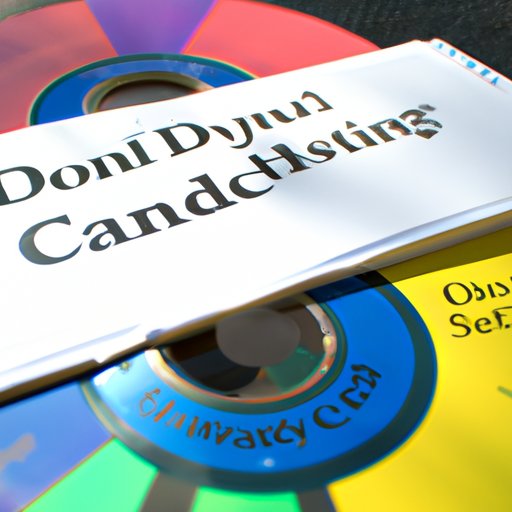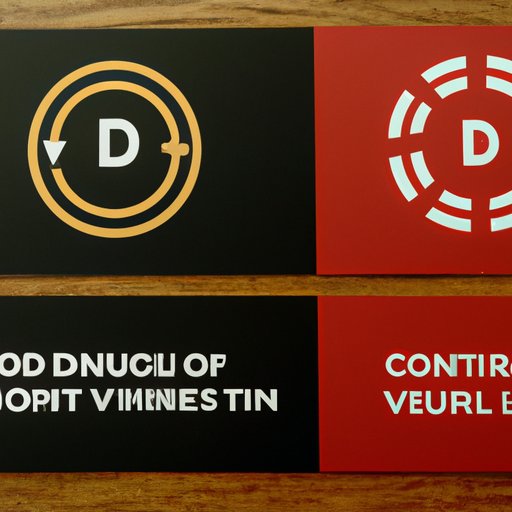Introduction
A financial certificate of deposit (CD) is a type of investment that offers potential returns in the form of interest. CDs are offered by banks, credit unions, and other financial institutions, and they can be an attractive option for those looking to diversify their portfolios and grow their savings over time. By understanding the benefits and risks associated with financial CDs, investors can make informed decisions about whether this type of investment is right for them.
What is a Financial CD?
A financial CD is a type of deposit account that typically pays higher interest rates than regular savings accounts. They are insured by the Federal Deposit Insurance Corporation (FDIC) up to $250,000 per depositor, so you can rest assured that your money is safe. When you open a CD, you agree to keep your money in the account for a set period of time, usually ranging from three months to five years. The longer the term of the CD, the higher the interest rate you will receive. At the end of the term, you can choose to withdraw your money plus the interest earned or reinvest it into a new CD.
Benefits of a Financial CD
One of the primary benefits of investing in a financial CD is the potential for higher returns compared to other types of investments. According to a study by Bankrate.com, CDs offer much higher returns than traditional savings accounts, money market accounts, and even some bonds. Additionally, CDs are considered low-risk investments as they are FDIC insured, meaning that your principal investment is protected against loss due to bank failure.
Financial CDs can also be beneficial for those who want to save for a specific goal. Because you agree to keep your money in the CD for a set period of time, it can help you stay disciplined and remain focused on reaching your goals. Additionally, CDs offer a predictable return, so you know exactly how much your money will be worth at the end of the term.
How to Choose the Right Financial CD for You
When choosing a financial CD, it’s important to assess your needs and research your options. First, consider your goals and decide what type of return you are looking for. Are you saving for retirement, a down payment on a house, or another long-term goal? Once you have determined your goals, you can begin researching the different types of CDs available. It’s important to compare interest rates, fees, and terms before making a decision.
You should also consider the type of CD that best meets your needs. For example, if you are saving for a short-term goal, a short-term CD may be a better option than a long-term CD. On the other hand, if you are looking for more flexibility, you may want to consider a no-penalty CD, which allows you to withdraw your funds without incurring a penalty.

Strategies for Making the Most of Your Financial CD
Once you have chosen the right CD for you, there are several strategies you can use to maximize your returns. One strategy is to take advantage of higher interest rates. Many banks and credit unions offer tiered interest rates, meaning the longer you keep your money in the CD, the higher the rate you will receive. Additionally, you can take advantage of early withdrawal penalties by keeping your money in the CD for the full term and then withdrawing it when the penalty has expired.
Another popular strategy is laddering, which involves opening multiple CDs with staggered terms. This allows you to access some of your money each year while still taking advantage of higher interest rates. Finally, you can use rollover opportunities to transfer your CD balance to another institution and take advantage of better rates.

Understanding the Risks Associated with Financial CDs
It’s important to understand that there are risks associated with investing in financial CDs. One of the primary risks is tax implications. Depending on the type of CD you purchase, you may be subject to taxes on the interest earned. Additionally, inflation risk is always present when investing in CDs as the rate of inflation can erode the value of your returns. Finally, liquidity risk is a factor to consider as CDs generally require you to keep your money in the account for a set period of time.

Comparing Financial CDs to Other Investment Options
When deciding whether to invest in a financial CD, it’s important to compare it to other investment options. Stocks and bonds offer the potential for greater returns but also come with more risk. Money market accounts offer higher interest rates than traditional savings accounts, as well as the ability to access your money more easily. Finally, savings accounts can be a good option for those who want to save for a short-term goal but don’t want to lock their money away for a long period of time.
Tips for Managing Your Financial CD Portfolio
Once you have invested in financial CDs, it’s important to manage your portfolio in order to get the most out of your investments. Regularly review your investments and make sure that your CDs are still meeting your goals. Consider rebalancing your portfolio if your goals have changed or if you find a better rate elsewhere. Finally, take advantage of rollover opportunities to transfer your CD balances to other institutions and take advantage of higher rates.
Conclusion
Financial CDs can be an attractive option for those looking to diversify their portfolios and grow their savings over time. By understanding the benefits, risks, and strategies associated with financial CDs, investors can make informed decisions about whether this type of investment is right for them. Additionally, by regularly reviewing their investments, taking advantage of rollover opportunities, and utilizing laddering strategies, investors can make the most of their financial CD investments.
(Note: Is this article not meeting your expectations? Do you have knowledge or insights to share? Unlock new opportunities and expand your reach by joining our authors team. Click Registration to join us and share your expertise with our readers.)
